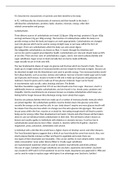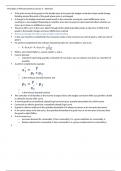In P2, I will describe the characteristic of nutrients and their benefit to the body. I
will describe carbohydrates, proteins, lipids, vitamins, minerals, energy, other diet-
related consumption and groups.
Carbohydrates
Three dietary sources of carbohydrate are bread (12.8g per 100g serving), potatoes (17g per 100g
serving) and bean (21g per 100g serving). The function of carbohydrates within the body is to
provide energy so that the body and organs can work appropriately. Carbohydrates are changed
over into glucose which can be used as energy straight away or put away within the form of
glycogen. There are carbohydrates which the body can and cannot digest,
the indigestible carbohydrates are known as fiber. It travels through the intestines and
can too be used to support great digestive health. Carbohydrates are vital and should make up 50%
of our diet. There are four sorts of carbohydrates: sugars, starch, non-starch polysaccharides and
sugar substitutes. Sugar occurs in food normally but can too be made artificially,
sugar actually occurs in fruits and milk.
The two fundamental shapes of sugar are glucose and fructose which are found in fruits. They are
made up of a single molecule of monosaccharides and are simple for the body to digest. Glucose can
be absorbed straight into the bloodstream and used to provide energy. Two monosaccharides would
form disaccharides, such as sucrose, lactose and maltose. Sucrose is found in table sugar and is made
up of glucose and fructose, lactose is found in milk and is made up of glucose and galactose and
maltose is found in grains and is made up of two glucose molecule. Sugar can be found
in nourishments such as rolls, cakes, ketchup and beer. The British
Nutrition Foundation suggests that 11% of our diet should come from sugar. Moreover, starch is
additionally known as complex carbohydrates, and are found in rice, bread, pasta, potatoes and
chapattis. Starchy nourishments are moreover known as complex carbohydrate which keep you
feeling full for longer because they discharge energy more slowly than sugars.
Starches are polysaccharides which are made up of a number of monosaccharide molecule which
are joined together. All carbohydrate particles must be broken down into glucose some time
recently the energy can be used by cells. In case body doesn’t require any more glucose insulin will
be release from the pancreas which can change over the extra glucose into glycogen. This would
be put away within the liver, muscles or as body fat. Not eating enough starch will lead to protein
being use for energy rather than development and repair. Muscle and other tissues will be broken
down in case an individual needs carbohydrates in their diet. This will lead to what is known as
ketosis and usually applies to individuals with diabetes or anorexia nervosa. A eat less low in
carbohydrates would also be low in fiber, vitamin A, vitamins within the B gather, vitamin E,
magnesium, press, potassium, antioxidants and calcium.
A individual with a diet like this would have a higher chance of develop cancer and other diseases.
The Food Standard Agency suggests that a third of our food should be come from starch. Also, non-
starch polysaccharide is known as fiber and found in vegetable and cereal, there are
two types of fiber dissolvable and insolubles. (This can be clarifies in more details within ‘other diet
relate consumption’ areas under dietary fibber’s). Finally sugar substitutes
are manufactured sweetener which are used to sweeten nourishments and drinks without
the uses of sugar. Example of sugar substitutes are saccharin, aspartame and sorbitol. Saccharin
was created in 1879 and it is first sweetener to ever be made. Aspartame was approved in 1982 and
can be used in recipe to replace sugar which gives it an advantage over Saccharin. Sorbitol



